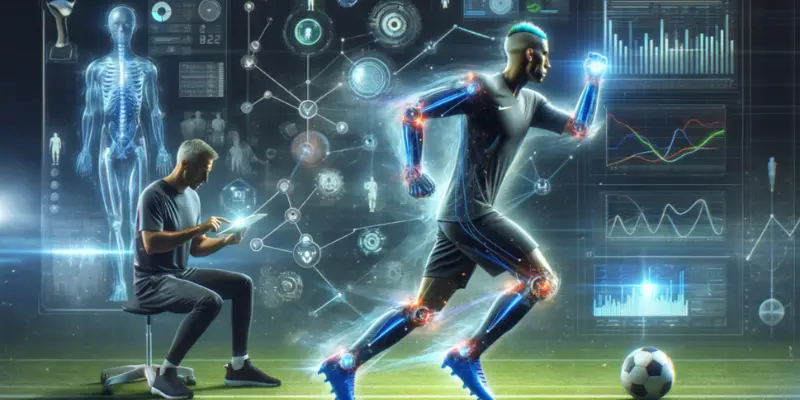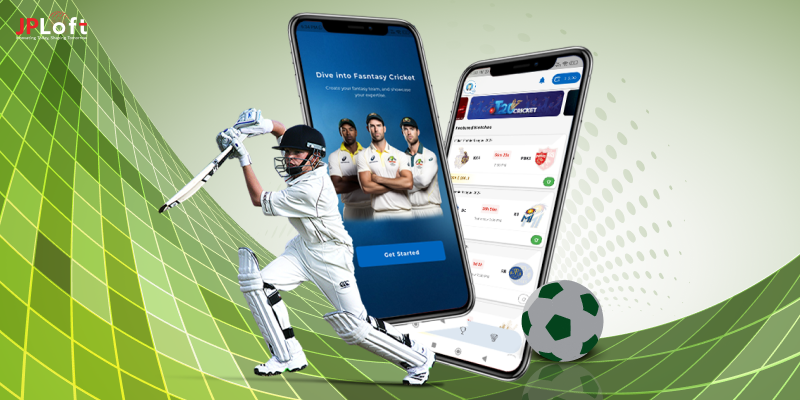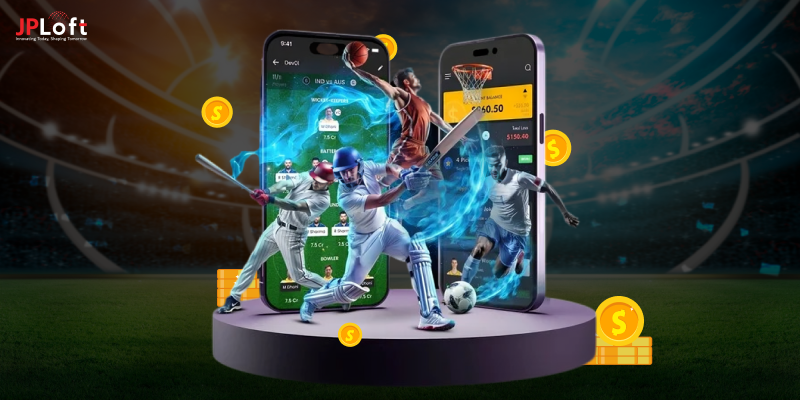Technological breakthroughs are changing the sports business at lightning speed. While data has always been crucial in sports, one breakthrough in Ai has changed how we connect with games and their methods. Our focus today is on the exciting rise of AI in sports.
Over the past twenty years, artificial intelligence has changed how players, reporters, marketers, and fans experience sports by providing real-time information. AI's capacity to enhance predictions results in improved decision-making across various domains.
Despite its broad use, AI’s full promise in sports remains underexplored. We think AI will become even more integrated into teams and businesses as its accuracy and good effect continue to grow.
Join us as we explore AI’s game-changing role in sports, its current uses, and what lies ahead in this exciting tech-sports change!
AI Statistics in Sports and Gaming
The AI in sports industry has seen rapid growth in recent years, driven by improvements in AI technology, higher spending by sports groups, and a rising demand for data-driven insights. For instance, the global sports analytics market is expected to reach $32.31 billion by 2032.
Similarly, the global AI sports industry is projected to hit $23.33 billion by 2031, showing the fast acceptance of AI solutions by sports teams, leagues, and tech providers. Factors like player tracking, real-time data, AI-driven sports betting apps, and forecasts are driving this rise. Furthermore, virtual assistants and robots are being utilized more and more to engage with fans.
Mobile apps such as ESPN, NBA, and AI SmartCoach are also helping assess player performance, providing them with valuable chances for improvement.
How AI Being Used In Sports Analytics
AI covers a wide array of "smart" technologies that are changing countless businesses. By studying data for insights, simplifying chores, improving processes, and enhancing customer experiences, AI is changing how companies run.
In the sports sector, AI's prediction powers allow organizations to make data-driven choices, promoting creativity and efficiency. AI in sports includes data collection and real-time processing—watching players, studying performance, and using predictive models to improve training and strategy. This AI system is changing sports by avoiding accidents, connecting fans, and providing realistic experiences.
The main goal of AI in sports is to improve performance both on and off the field. AI and machine learning are making a significant effect with game-changing apps that will enhance performance, strategy, and fan involvement. Let's dive into the top AI app development ideas changing the sports world.
Game Analytics
Game analytics is a complex tool that offers deep insights into sports events. One critical application of AI in this area is referee help, where technologies like ball tracking systems monitor the ball's position and movement in real-time, aiding judges in making correct decisions.
Another important aspect is match analysis, which studies goals, mistakes, changes, and more to assess team performance and tactics. AI-driven systems can also study vast information to create forecasts and valuable insights, especially for sports betting.
In essence, game analytics uses cutting-edge technologies to offer a complete view of sports, providing critical insights that improve decision-making and strategy.
Talent Identification and Acquisition
Discovering and gaining ability in sports includes physics, performance rating, and employment. Biomechanics helps measure players' physical skills and movement patterns, finding possible talent. With the integration of IoT in sports apps, player performance evaluations become more exact, analyzing skills, abilities, and general performance to guide employment choices.
Strategy Improvement
AI-powered research now offers an edge by studying opponent data to spot patterns and trends. Teams can improve tactics, perfect team combos, and make real-time tactical changes during games.
Training and Coaching
AI improves training and teaching through strategy planning, player injury models, and team formation assessment. AI tools help teachers spot injury risks, create protective measures, and build united teams by measuring player strengths and flaws.
Injury Prevention
Real-time biometric tracking is important for harm avoidance. AI apps watch player tiredness, stress, and injury risks, warning coaches and medical staff for quick action to reduce injury rates.
Fan Engagement and Immersive Experiences
AI-driven analytics customize fan interaction, creating content and ads based on fan habits and tastes. Meanwhile, AI-powered shows offer unique camera views, augmented reality overlays, and virtual reality elements, providing fans with engaging and collaborative watching experiences.
With machine learning's success across all these areas, AI continues to change sports. Below are real cases of AI being used in the industries.
Leverage with Officiating
AI is changing sports judging, improving accuracy and fairness across different leagues. The NBA uses AI to enhance foul calls, while MLB adds it to trackball and strike positions, helping in strategic choices.
The NHL engages AI to check goals, ensuring fair results, and the PGA uses it to identify fouls for better game tactics. Even the NFL relies on AI to judge close calls, lowering human mistakes and bias and giving more uniform data for game planning.
In short, AI is setting a new standard in judging, ensuring greater accuracy and fairness for players, teams, and fans alike.
Predictive Modeling
AI-powered prediction modeling predicts game results and player accidents by studying biometrics, surrounding factors, and previous data. This allows teams to create harm-protection methods and improve game plans by modeling various situations.
Sports Equipment
AI is also changing sports equipment design. Leading brands like Adidas and Wilson are using AI to build high-performance gear, such as AI-powered soccer balls and tennis rackets that improve precision, power, and accuracy. These advancements not only improve performance but also allow custom tools suited to players' unique needs, changing training and sports potential.
AI Applications in Sports Business
AI has changed different businesses, and sports are no exception. From enhancing player performance to improving fan interaction and transforming business operations, AI is reshaping how the sports industry works.
The merging of AI in sports includes various areas such as game analytics, predictive models, injury avoidance, employment, personalized training, and even advertisement. This detailed study will provide a thorough understanding of how AI is being used in sports and how AI-powered sports app development is set to take this change to the next level.
AI-Powered Sports Predictions
One of the most exciting parts of AI in sports is its ability to guess match results. Traditionally, predicting sports results relied on expert analysis and data insights, which had their limits. AI, however, takes this to a whole new level by studying vast amounts of past data, including team tactics, player stats, and in-game events such as key plays, goals, and ball control. AI systems can predict match results with significant accuracy by combining all these factors.
While AI in sports predictions cannot promise 100% accuracy, its statistical models offer far more accurate estimates than traditional methods. Around 47% of sports categories now use AI-driven tools to predict results based on factors like goals scored, key plays, or how players work during critical times in a game. These insights help not only bettors but also teachers and managers to make informed strategy decisions during matches, improving competitiveness.
Enhancing Player Performance with AI
AI is also being leveraged to improve player ability, both on the field and in training. Wearable technology driven by AI is helping players gather critical data about their physical state, such as heart rate, tiredness levels, and possible pressure on muscles. This data can predict the chance of accidents before they occur, allowing teachers and medical staff to act early and change training plans to minimize risks.
Moreover, AI is used to measure individual and team performance, helping leaders create better game plans and strategies. For example, data analytics can help break down a player's weaknesses, showing whether they have trouble with defense or low shooting efficiency. This allows teachers to focus on focused changes, creating a data-driven feedback process that improves individual and team success.
Ai in sports goes beyond just health tracking and plan development. Computer vision, an advanced AI tool for sports app development, is applied to track human moves through film analysis. In swimming, for example, AI can watch a swimmer's underwater moves and provide quick feedback on their stance and technique, giving more exact insights than traditional methods.
Automated Sports Journalism
AI’s effect on the sports industry is not confined to player success and match predictions. It also changes how sports are written and covered. Sports writing needs thorough reporting on scores, stats, and game highlights, which can be time-consuming and prone to mistakes when done mechanically. AI has introduced automatic systems that use natural language processing (NLP) to turn scientific data into exciting tales.
For instance, AI can make stories for local matches without having human media on the field. The system can study game videos, extract important moments, and instantly produce a report outlining the match highlights, goals, fouls, and other significant events. This kind of automation ensures that even lower-tier games, which might not get wide media attention, are still covered successfully.
Personalized Training and Diet Plans
Athletes require specific training and diet plans to keep peak physical form. AI-powered apps can now build personalized training routines and food plans suited to each athlete's unique needs. These apps consider things like the player’s physical traits, health goals, and performance data to suggest ideal practices. For example, AI fitness apps can track a player's calorie intake, suggest meals, and change their diet plan based on future games or rest times.
A notable AI app development in this area is the rise of AI healthcare apps for women’s sports, where keypoint skeleton models are used to identify joint moves for yoga or Pilates. This personalized approach to training not only helps players improve their performance but also lowers the risk of harm through designed routines that account for individual strengths and weaknesses.
Scouting and Recruitment
AI has also made a significant effect on potential discovery and employment in sports. Traditional scouting methods, which rely heavily on subjective human opinion, are now being supplemented by data-driven insights. AI uses machine learning algorithms to track players’ moves, body positions, and performance measures across different games to find top talent.
In football, for instance, AI systems study the playing styles of possible students, tracking measures such as pass accuracy, run speed, and stamina. This method helps teams to make more informed choices when hiring players. It also lowers human bias, ensuring that choices are based on objective success data.
AI in Sports Advertising
AI in sports is also changing the way brands promote sports. AI programs can study crowd demographics, fan tastes, and behavior during games to create ads more effectively. For instance, if an AI system finds that a particular highlight moment in a match garners the most attention, marketers can place their ads around these times for maximum exposure.
Moreover, AI-driven advertising helps brands focus their campaigns more accurately, providing content that connects with specific groups of fans based on real-time data. This specialized method increases interaction and improves the efficiency of marketing tactics.
AI and Ticketing at Major Sports Events
Large-scale sports events often face problems linked to crowds at venue exits. AI offers creative ways to meet these issues. One example is AI-powered face recognition technology, which allows fans to enter the venue without having to show an actual ticket. This simplifies entry processes, lowers wait times, and enhances the entire fan experience.
Predictive analytics by AI can also be used to predict crowd numbers and manage venue resources. These insights ensure that venues are properly prepared with food, drinks, and other amenities, thereby improving the event experience for everyone involved.
Future of Artificial Intelligence in Sports Industry: What to Expect
AI has changed the sports business, improving competition across the board. From game planners and sports companies to marketers, team owners, and even onlookers, AI-powered sensors and algorithms are giving critical insights, changing the way sports are played, sold, and watched. The meeting of AI and sports is not just a technological development; it is changing business rules and driving innovation throughout the industry.
As more organizations understand AI's huge potential, they are increasingly engaging in AI app development services, especially in sports app development. AI's ability to study massive amounts of data in real time is proving useful in areas such as predictive analytics, player recruiting, and even the development of smart sports equipment. This deep dive into AI’s changing effect on sports explores how these technologies are helping players, teams, and fans experience the game in entirely new ways.
Predictive Analytics: Data-Driven Strategy
AI mixed with Big Data is at the heart of sports innovation, especially in prediction analytics. By studying vast amounts of data, AI systems can predict game results, player injuries, and even future performance trends based on previous data. These prediction models not only improve strategy planning for leaders and teams but also affect real-time decision-making during games.
For example, prediction analytics can determine when a key player is more likely to get hurt, allowing the teaching staff to change training plans and avoid overexertion. Similarly, game planners can use AI to guess how a particular group or play might fare against an opponent based on previous matches, weather conditions, and player form. This data-driven approach to sports has made AI an important tool for getting a competitive edge.
Virtual and Augmented Reality: Enhancing Training and Spectatorship
Artificial Intelligence is also set to change both athlete training and fan experiences through Virtual Reality (VR) and Augmented Reality (AR). AI-powered VR allows players to engage in virtual settings where they can improve their skills in realistic game situations. This is particularly helpful for training in high-pressure settings, such as penalty shootouts in soccer or free throws in basketball, without the need for real gameplay.
On the spectatorship front, AR technology can significantly improve the fan experience by adding real-time data, images, and extra pictures on live sports events. For instance, AR can superimpose statistics such as player speed, distance covered, or shot patterns during a match, giving fans a more profound, more involved watching experience. AI-enhanced VR and AR are not just tools for engagement—they’re changing the boundaries of how sports are played, taught, and watched.
Player Recruitment and Scouting: More Data, Better Decisions
AI is changing the way sports teams scout and hire stars. Traditionally, scouting involved hours of film analysis, travel, and biased reviews by talent spies. AI and machine learning programs have simplified this process by quickly studying player numbers, game video, and even social media data to spot rising talent. This not only saves time and resources but also improves accuracy in employment choices.
By studying thousands of data points, AI can measure player potential in various metrics such as speed, endurance, tactical intelligence, and flexibility to specific team tactics. Teams can make more informed decisions about which players will likely thrive in their schemes. In addition to major sports teams, this technology is being used in college marketing and even by child schools to spot future stars early in their growth.
Ethical and Regulatory Challenges
While AI has many benefits, its inclusion in the sports industry also raises social and legal issues. One of the main difficulties is data safety. With AI collecting vast amounts of data from wearable technology, smart equipment, and in-game monitors, there is a growing need to protect personal information, especially around health and performance data.
Moreover, AI’s impact on sports betting adds another layer of complexity. As AI tools become more advanced in predicting results, there is the potential for AI to be misused in gaming scams. Regulatory groups will need to adopt clear rules on how AI can be used in this area to keep balance and openness in sports betting.
Innovation in Sports Equipment: The Age of Smart Gear
Another exciting development is the integration of AI into sports tools. Smart gear equipped with sensors and AI powers is already making waves. These clever gadgets can track an athlete’s form, skill, and success in real-time, giving quick input for growth. For instance, smart shoes equipped with AI devices can analyze running methods and suggest changes to improve speed, reduce injury risks, and increase endurance.
In tennis, AI-powered rackets can track a player’s spin, pace, and grip strength, helping them improve their game. Similar innovations are being developed across different sports, from football boots that record hits to ensure player safety to smart golf clubs that provide data on swing techniques. This integration of AI into sports gear is speeding the pace of physical growth and changing how players approach their training routines.
FAQ’s
Q. How is AI being used in sports analytics today?
AI is changing sports analytics by handling vast amounts of data to discover insights on player performance, harm avoidance, and game plans. Machine learning models can predict results, improve training, and provide real-time data during games.
Q. What part does AI play in sports?
Artificial intelligence in sports helps evaluate data to improve team performance, boost teaching methods, and predict game results. AI also plays a major part in automating processes like video analysis and sports photography.
Q. How does AI affect sports betting?
AI in sports betting offers correct predictions by studying past data, team success, and game conditions. Platforms like Technivorz use AI to improve betting tactics, improving accuracy in guessing sports results.
Q. What are AI sports predictions?
AI sports predictions use machine learning to forecast game results by studying team stats, player behavior, and real-time data. These predictions are applied to various sports, from football to cricket, improving decision-making in gaming.
Q. How is artificial intelligence used in baseball?
AI is used in baseball to watch player moves, study throwing methods, and improve team plans. AI-powered tools provide real-time feedback on game success, letting leaders make informed decisions.
Q. What is an artificial intelligence football predictor?
An AI football forecast uses machine learning to study player and team data, predicting game results. These methods help teachers build strategies and are widely used in sports betting for correct guesses.
Q. How does AI watch football games?
AI-powered cameras and algorithms can track player moves, ball position, and game data in real-time, providing advanced information for teaching and fan interaction.
Q. What is the AI change in sports betting?
The AI shift in sports betting refers to the use of machine learning and data analysis to improve the accuracy of betting predictions, reduce risks, and enhance the entire betting experience.
Q. How does AI improve sports photos?
AI in sports photography uses algorithms to catch the best moments, improve picture quality, and simplify the process of tagging and arranging photos based on player moves and game events.
Q. How is AI used in cricket?
AI is used in cricket for performance research, player tracking, and predicting match results. AI-powered tools help teachers study data on hitting and bowling skills while also helping in sports betting predictions.
Q. What is Infinity Sports AI?
Infinity Sports AI refers to a tool or system that uses AI to provide predictive analytics, team performance insights, and betting strategies across multiple sports, improving accuracy and decision-making.
Q. What are the best AI sports forecast platforms?
The best AI sports forecast systems, like Technivorz and Infinity Sports AI, use advanced algorithms to guess game results, improving sports betting accuracy and giving insights for team strategies.
Q. How is machine learning used in sports?
Machine learning in sports is used for player performance analysis, harm avoidance, and game plan improvement. It uses data from past games to predict future results and improve team performance plans.













Share this blog